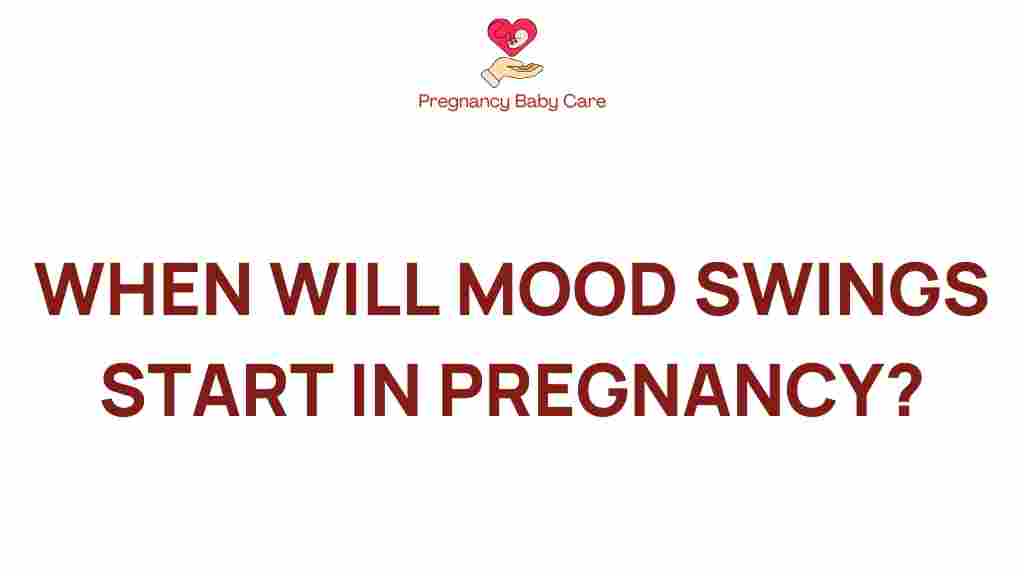Unraveling the Mystery: When Do Mood Swings Begin in Pregnancy?
Pregnancy is a transformative journey, filled with anticipation and excitement. However, it can also bring about significant emotional changes, particularly in the form of mood swings. For many expectant mothers, these shifts can be confusing and overwhelming. Understanding when and why these mood swings occur is crucial for managing mental health during this critical period. In this article, we will explore the connection between hormonal shifts and mood swings, the timing across different trimesters, and effective coping strategies.
Understanding Mood Swings in Pregnancy
Mood swings during pregnancy are a common experience. They can manifest as sudden changes in emotion, ranging from happiness to irritability, sadness, or anxiety. These fluctuations are primarily due to the significant hormonal shifts that occur in a woman’s body. The primary hormones involved include:
- Estrogen: Levels rise dramatically during pregnancy, impacting mood regulation.
- Progesterone: This hormone helps maintain pregnancy but can also induce feelings of lethargy and irritability.
- Oxytocin: Known as the “love hormone,” it plays a role in bonding but can also contribute to emotional highs and lows.
These hormonal changes can lead to increased sensitivity and emotional responses, making it essential for expectant mothers to be aware of their mental health.
When Do Mood Swings Begin in Pregnancy?
Mood swings can begin as early as the first trimester, often starting around the sixth week of pregnancy. However, the intensity and frequency can vary significantly among women. Here’s a breakdown of how mood swings typically manifest across different trimesters:
First Trimester
During the first trimester, many women experience profound changes in their bodies and emotions:
- Hormonal Changes: Rapid increases in estrogen and progesterone can lead to heightened emotions.
- Physical Symptoms: Nausea, fatigue, and other physical discomforts can exacerbate mood swings.
- Stress and Anxiety: The uncertainty of pregnancy can lead to increased anxiety levels.
These factors combined can create a whirlwind of emotions that may be difficult to manage.
Second Trimester
As pregnancy progresses into the second trimester, many women report feeling more stable. However, mood swings can still occur:
- Physical Relief: Many women experience relief from early pregnancy symptoms, leading to improved mood.
- Body Image Changes: As the belly grows, feelings about body image may fluctuate.
- Expectations: Anticipation of the baby’s arrival can bring joy, but also anxiety about the future.
Overall, the second trimester might bring more emotional balance, but it’s not uncommon to experience ongoing mood swings.
Third Trimester
In the third trimester, mood swings can become more pronounced again due to:
- Physical Discomfort: Increased size and discomfort can lead to frustration and irritability.
- Nesting Instinct: The urge to prepare for the baby can cause stress or overwhelm.
- Hormonal Fluctuations: Hormones continue to fluctuate as the body prepares for labor.
The emotional rollercoaster can be intense, and many women find themselves feeling more emotional as the due date approaches.
Coping Strategies for Mood Swings
Recognizing that mood swings are a normal part of pregnancy can help expectant mothers cope better. Here are some effective coping strategies:
- Stay Active: Regular exercise, like walking or prenatal yoga, can enhance mood and reduce stress.
- Talk It Out: Sharing feelings with supportive friends, family, or a counselor can provide relief.
- Practice Self-Care: Engage in activities that promote relaxation, such as reading, bathing, or meditation.
- Healthy Eating: A balanced diet can positively influence mood and energy levels.
- Sleep Well: Prioritize rest and create a calming bedtime routine.
Incorporating these strategies into daily life can help manage the emotional ups and downs of pregnancy.
Importance of Prenatal Care
Regular prenatal care is essential for monitoring both physical and mental health during pregnancy. Here are some important aspects to consider:
- Regular Check-Ups: These appointments allow healthcare providers to monitor hormonal levels and overall health.
- Mental Health Screening: Discussing emotional well-being with a healthcare provider can provide support and resources.
- Education: Understanding what to expect during pregnancy can alleviate anxiety and prepare for changes in mood.
Establishing a good relationship with a healthcare provider can make a significant difference in managing mood swings and ensuring a healthy pregnancy.
Troubleshooting Mood Swings
If mood swings become overwhelming, it’s essential to identify potential triggers and address them proactively. Here are some troubleshooting tips:
- Identify Triggers: Keep a journal to note patterns in mood changes and associated activities or thoughts.
- Limit Stressors: Reduce exposure to known stressors, whether they are work-related, social, or personal.
- Seek Professional Help: If mood swings lead to severe anxiety or depression, consult a mental health professional.
- Communicate: Let your partner or support network know how they can help you during tough times.
Recognizing and addressing these issues can help maintain emotional stability during pregnancy.
Conclusion
Mood swings during pregnancy are a natural part of the journey, influenced by hormonal shifts, physical changes, and emotional responses. By understanding when these changes typically occur and employing effective coping strategies, expectant mothers can navigate this emotional landscape more effectively. Regular prenatal care and open communication about mental health are essential in ensuring both the mother’s and baby’s well-being. Remember, you’re not alone in this journey, and support is always available. For more information on prenatal care, you can visit this resource. If you’re looking for community support and shared experiences, consider joining forums or local groups for expectant mothers.
This article is in the category Pregnancy and created by PregnancyBabyCare Team
